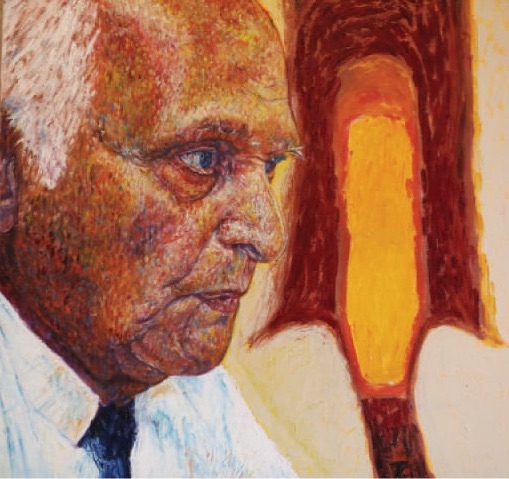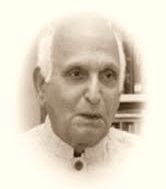Intizar Husain: Finding Past Again by Muhammad Badar Alam
 Where the sparrows chirp, the cuckoo sings, the trees sway and the monkeys frolic, there lives Intizar Husain. In his idyllic abode, there exists no distance between the human and the natural, between the real and the ethereal. In fact the two worlds appear fused into each other. There is, indeed, no transition from one to the other but only a continuous flow in which everything – even houses, streets, trees, apparitions and ghosts – seems to be an inseparable ingredient of the community’s life. Sadly this heavenly lodging exists only in the mind of its sole human dweller.
Where the sparrows chirp, the cuckoo sings, the trees sway and the monkeys frolic, there lives Intizar Husain. In his idyllic abode, there exists no distance between the human and the natural, between the real and the ethereal. In fact the two worlds appear fused into each other. There is, indeed, no transition from one to the other but only a continuous flow in which everything – even houses, streets, trees, apparitions and ghosts – seems to be an inseparable ingredient of the community’s life. Sadly this heavenly lodging exists only in the mind of its sole human dweller.
In reality, Husain lives in a single-storey concrete house among a jungle of brick and mortar off one of Lahore’s busiest roads. Car dealers, auto-workshops and private schools thrive where he would have liked his Garden of Eden to exist. Yet he is quite satisfied, having spent his childhood in a town which was as close to his ideal as possible. “I have idealised my childhood,” he tells the Herald while talking about his native town of Dibai. Located near Aligarh city in Uttar Pradesh, the town was “closer to nature than to cities,” he recollects. “People there had never heard any unfamiliar voice. New sounds – like the noise of a moving train – were not known to them.”
For young Husain, born on December 12, 1925 to a “fundamentalist” father, life in Dibai was an unceasing carnival of religious festivities.
“There was a lot of glamour attached to Shab-e-Baraat then. Alas, it no longer exists because of the puritans among us,” he laments. In those days, recalls Husain, the Hindus and the Muslims would participate in each other’s festivals without fear or trepidation. In fact, the young Husain would steal lamps from the parapets of his Hindu neighbours on the night of Diwali. “No one ever objected to that.”
This is not to say that life was all bliss in Dibai; it’s just that he does not want to remember its unpleasant aspects. “We are always selective about our past. We remember only the things which we want to remember. If there was a Hindu-Muslim riot in Dibai, I would better not remember it.”
His father, Manzar Ali, was an orthodox Shia Muslim and wanted his only son – born after four daughters – to acquire religious education. “My father was against modern education,” he says, “So I was schooled at home and was mainly taught Arabic, Persian and religious texts. I also memorised the translation of a sizeable portion of the holy book.”
This changed when the family moved to a bigger place, called Hapur and Husain was admitted to school, where he got more than just formal education. “Somehow, I could not get admission to the government school in Hapur and the only other option was a Hindu school.” It was here that he imbibed the spirit of Hindu-Muslim harmony and learnt Hindu mythology which proved important in his literary career. “Though I was only one of the two Muslim students in my school, I never felt any religious bias.”
Next he moved to Meerut for college education. “After I did my BA, like all other graduates I too wanted to sit for the civil services exam and I also wanted to do my Masters. But as my parents could no longer bear the expense of my education, I had to do odd jobs at Meerut – which was a big cantonment town – to continue my studies.”
It was here that he met people such as Saleem Ahmed and Jamil Jalibi who were all aspiring writers then. He also came across Muhammad Hasan Askari who had already found his footings as a critic. “Askari became my mentor” and it was on his advice that Husain migrated to Lahore. Courtesy his mentor, the young writer did not face any trouble in settling down in Lahore. “He found me a job as the editor of a magazine called Nizam that was the official organ of the Progressive Writers’ Movement,” says Husain. “My family joined me later.”
But for millions of others, migration was far from a smooth affair. The riots shattered the romance of communal harmony that Husain was living in. “As a writer, I am a creation of the Partition.”
But Husain’s relationship with Partition is not a typical one. He did not mourn the loss of communal harmony as Krishan Chandar did. Nor did he attempt, à la Saadat Hasan Manto, to unveil the hidden evil that human beings are made of, which made itself visible during the Partition. He also did not eulogise a romanticised vision of the past as Qurratulain Hyder did. Rather, he saw the Partition as the beginning of a new era, which witnessed bloodshed because it failed to create an organic relationship with all the past eras and carry forward the continuity of a historical sensibility. In other words, he did not repeat the past for its sake but for the sake of the present; he brought in the former so that it could have a bearing on the latter.
But where did this past begin? In one of his essays, he says: “A new era does have a start, but where does the past start from?” He repeats the question in his 1987 novel Tazkara.
This search for the past led him to incorporate in his writings the experience of previous migrations and tribulations of the Muslims of India. His tools in this endeavour were the religious texts as well as the Muslim mythological characters and symbols. In one of his landmark essays he explains why he did this. Written in 1959 the essay entitled “Ijtimaee Tehzeeb aur Afsana” says: “…I do not write a short story. I just look for those lost to us … But if one starts looking for the fires of the past … one may reach as far as the battlefield of Karbala and even earlier than that to the battle of Badr … The short story writer does not link up to a particular period in the past but his relationship with history assumes the form of a link with the entire history.”
Nevertheless, Husain is also conscious that his short stories do not just become a search for the lost epochs. “…if a short story writer in Pakistan traces his link to the conflict in Karbala and the battle of Badr, it means that he is striving to incorporate the experience of Indo-Islamic cultural experience and the historical consciousness of 1400 years into the new sensibility of the nation. And in this relationship the past, the present and the future become an unbroken community.” His view of history as a continuous thread resembles his view about life which he conceives as a continuum between the natural and the human, between the external and the internal.
But these views have not been universally accepted. Husain’s detractors, for one, complain that his short stories written around the Partition do not represent the complete reality. In their opinion, he has written only about the migrants from his native Uttar Pradesh who are a fraction of the people who moved from India to Pakistan. More importantly, these stories ignore those who never migrated and always lived in the areas that became Pakistan. In a 1963 essay, “Hamaray Ahad Ka Adab”, he responds: “It’s not indeed a question of shifting from one area to the other but migrating from an old country to a new one. Some people reached Pakistan in special trains, others saw themselves entering a new country … without moving an inch. The soil under their feet … had now become Pakistan … If we accept this notion of migration, then it becomes more a spiritual situation than an external event.”
In the newly created country, the young writer flourished. In fact in the 1950s and early 1960s cultural and literary battles were at their fiercest and Husain was at the forefront. Still unmarried but with a stable job (first at dailies Imroze and Afaq and then a long stint at daily Mashriq that started in 1963 and ended in 1988) he had plenty of time to spend at the Pak Tea House, as a leading member of Halqa-e-Arbab-e-Zauq, debating the finer points of arts, culture and, most notably, literature. His foremost concerns then were the cultural invasion of the West and the introduction of a modern way of life. This made him take up cudgels against realism in writing and the impact of the motorised mobility on the cultural sensibility.
Tracing the history of Western cultural and literary influence on the thought of Indian Muslim writers and intellectuals, he finds that it started with people such as Sir Syed Ahmed Khan, Maulana Hali and Muhammad Hussain Azad. “In fact, Sir Syed and his companions were striving towards face-saving and wanted to rebuild trust … In the process [British historian] Gibbon and [essayist] Carlyle became the authority but our lost self-confidence never returned,” he writes in his 1961 essay “Alamaton Ka Zawal”. This process continued under the influence of realist writers and the leftist, radical rhetoric of the Progressive Writers’ Movement. It culminated in the creation of a prose and a poetry shorn of local cultural symbols and images. “When a language starts losing its symbols, it’s a dangerous omen that a society is forgetting its spiritual experience and is looking to get rid of its ‘self’. In Urdu, the realist movement was indeed a movement to forget the ‘self’.”
Husain acknowledges that there is nothing wrong in knowing the literature of the other parts of the world and experimentation in literary techniques but he insists that it should not happen at the cost of the local experience. “Even in the West writers such as James Joyce broke away with the realist tradition as early as the start of the twentieth century after Einstein and Freud put paid to the rationalist worldview,” he tells the Herald. In Pakistan, though, short story writers kept following one or the other of the three stalwarts of that movement — Chandar, Manto and Ismat Chughtai, though much has changed since then, he writes.
In his own search for a perfect technique, nevertheless, he has tried to understand what Joyce had done but spurned it after he found immense possibilities in employing the techniques used by Muslim Dastaans, Buddha’s Jatakas and the stories of Mahabharata. “These are strange and complex stories. Before one story ends, the seeds of another start sprouting … Some stories start laying eggs and bearing children even in the middle. This is a much bigger puzzle than (Joyce’s) Ulysses is,” he writes in his 1980 essay “Afsanay Main Chautha Khont”.

Intezar Hussain(1923-2016)
انتظار حسین کا شمار موجودہ عہد میں پاکستان ہی کے نہیں بلکہ اردو فکشن، خاص طور پر افسانے یا کہانی کے اہم ترین ادیبوں میں کیا جاتا تھا. انتظار حسین سنہ 1923 میں ہندوستان کے ضلع میرٹھ میں پیدا ہوئے اور میرٹھ کالج سے اردو میں ایم اے کیا. تقسیم ہند کے وقت ہجرت کر کے پاکستان آئے اور صحافت کے شعبے سے وابستہ ہو گئے.ان کے افسانوں کا پہلا مجموعہ ‘گلی کوچے’ 1953 میں شائع ہوا تھا.
